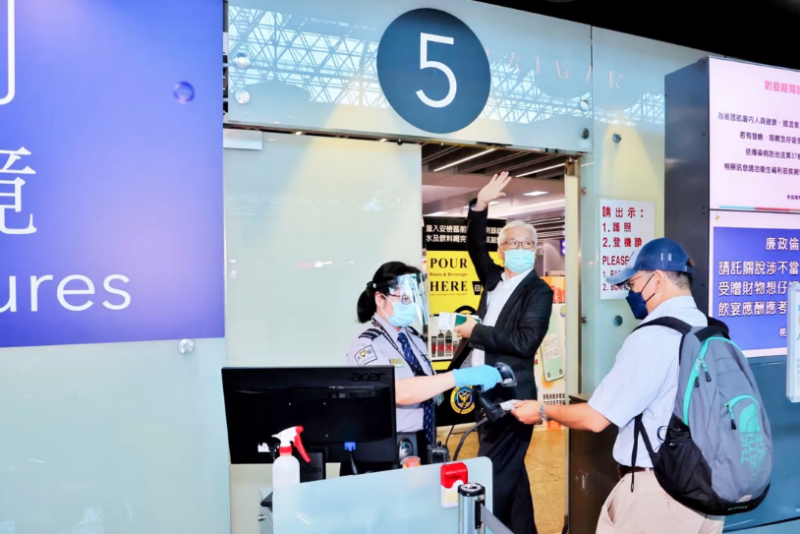
Taiwan: In response to Beijing's ongoing saber-rattling against the self-governing island, Taiwan's main opposition party, the Kuomintang, has sent a delegation to the mainland.
KMT Vice President Andrew Hsia and his group left for Xiamen in Fujian on Wednesday afternoon for what the party described as a 17-day "fact-finding" trip to improve cross-strait communications and to understand the plight that Which Taiwanese people face in mainland China. , Hsia is the former head of the Mainland Affairs Council, the island's apex body for planning mainland policy.
Before leaving Taiwan, Hsiao spoke at Taoyuan International Airport: "At this critical time, we need to express our concerns to our [compatriots] in mainland China and to have more communication channels for both sides. There is a strong need."
Hsiao stressed that the KMT has a duty to understand the challenges facing Taiwan's businessmen, students and others as cross-strait relations continued to deteriorate as one party experienced managing them.
Since Tsai Ing-wen was elected president in 2016 and rejected the one-China principle, relations between Taiwan and the mainland have deteriorated.
After Tsai moved closer to the United States to counter the mainland, Beijing cut official ties with Taiwan and increased military threats to the island.
US House Speaker Nancy Pelosi's visit to the island, which Beijing has repeatedly warned of and called a "provocation", has prompted the People's Liberation Army to conduct extensive live-fire exercises around Taiwan since last Thursday.
Pelosi, who is next in line for the US presidency, arrived in Taiwan on August 2, the highest-ranking US official to do so in the past 25 years. Beijing, which considers Taiwan's self-government as part of its territory, is furious and has called the visit a serious violation of its sovereignty.
According to Hsia, the KMT had previously voiced its concerns about the PLA exercise and condemned Beijing for its escalating military threats.
They claimed that the visit, which was held in June before the war games began, was intended to raise awareness of Taiwan's concerns on the mainland and to inform local authorities about their issues.
If we are to better fulfill our obligation to facilitate cross-strait exchanges and communications, we should not be constrained by any constraints, Hsiao said, even as Tsai herself has been the main had declared himself capable of negotiating with the land.
The independence-leaning Democratic Progressive Party of Tsai has strongly criticized the KMT visit at this critical time, failing to consider public sentiment and outrage over Beijing's saber-rattling.
The visit has drawn disdain from some DPP politicians who see it as proof that the KMT is moving to Beijing and perhaps selling Taiwan.
Even some members of the KMT strongly opposed the visit, arguing that the timing was inappropriate, especially after Beijing released a white paper on cross-strait relations on Wednesday that stressed Gaya that Taiwan is part of China and that reunification is necessary.
The visit was deemed "inappropriate" by the Mainland Affairs Council, which stated that Hsiao should not have led the delegation to the mainland while Beijing was oppressing Taiwan.
Hsia insisted that her delegation of five officials, each with knowledge of mainland affairs, would not attack Beijing's united front after just one visit.
Hsiao denied some local media reports that he was on his way to meet with Wang Yang, the chairman of the National Committee of the Chinese People's Political Consultative Conference, and the head of the Taiwan Affairs Office, Liu Jie, said during his visit that the delegation had no clue. There was no plan. Take a trip to Beijing or meet with senior officials from the mainland.
He announced that if invited, he would not rule out the possibility of meeting with local mainland Chinese officials.
Asked whether he was concerned about the KMT's prospects in local elections in November, he replied that Taiwan was a pluralistic society full of diverse voices. “While some oppose our arrival, some others support us,” he said, adding that the KMT must fulfill its mandate and not be stopped from doing so just because it was difficult.
Regarding the white paper, Hsiao claimed that while Beijing had long held views on reunification, Taiwan had its own stand on the mainland.
It is unlikely that our position will change as a result of anything said on the other side of the Strait of Taiwan. He said Beijing must also accept the reality of our existence.
Due to the quarantine rules, the KMT delegation is expected to be in Xiaomi for 10 days. Thereafter, it traveled to Guangzhou, Zhejiang, Jiangsu to catch a flight to Taipei before returning to Xiamen on 26 August.
China publishes a white paper pledging its "greatest sincerity" regarding the unification of Taiwan
Sad and stranded Indian students desperate to go back to China
The pending Taiwan bill could be a "direct challenge" to US-China relations.